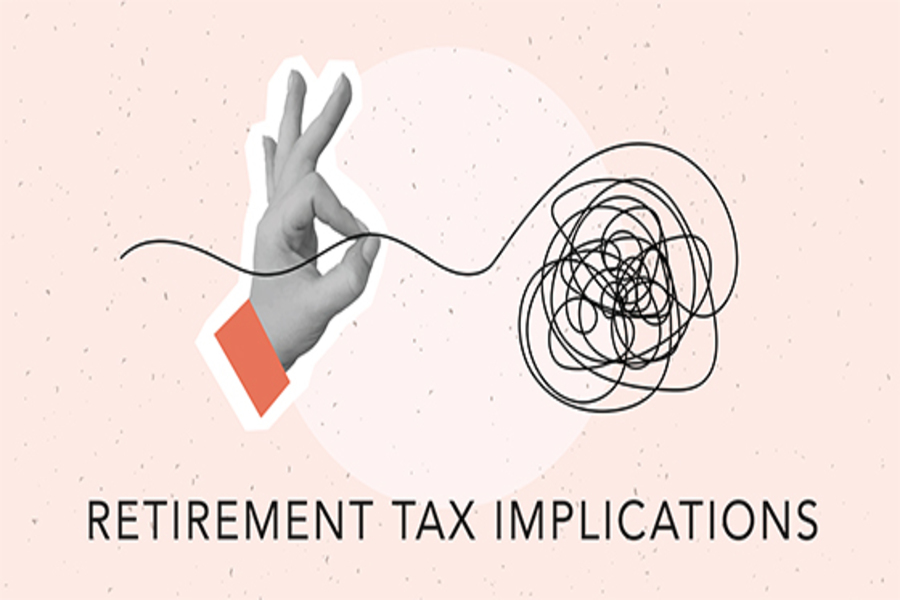On March 21, 2025, the IRS released updated FAQs and guidance that introduce a new process for taxpayers dealing with Employee Retention Tax Credit (ERTC) refunds, particularly when those refunds relate to wages paid in prior tax years like 2020 or 2021. This update aims to simplify reporting requirements and provide clarity for taxpayers who either received ERTC refunds or had their claims disallowed. Here’s a breakdown of what this means for you and how to handle your tax filings moving forward. . Background on ERTC and Wage Expenses The Employee Retention Credit, introduced as part of COVID-19 relief measures, allowed eligible businesses to claim a credit for qualified wages paid to employees. However, claiming the ERTC comes with a catch: taxpayers are generally required to reduce their...

If an individual taxpayer has substantial business losses, unfavorable federal income tax rules can potentially come into play. Here’s what you need to know as you assess your 2024 tax situation. Disallowance rule The tax rules can get complicated if your business or rental activity throws off a tax loss — and many do during the early years. First, the passive activity loss (PAL) rules may apply if you aren’t very involved in the business or if it’s a rental activity. The PAL rules generally only allow you to deduct passive losses to the extent you have passive income from other sources. However, you can deduct passive losses that have been disallowed in previous years (called suspended PALs) when you sell the activity or property that produced...
A business interest’s value is more than just a number to its owner. It represents years of hard work, sacrifice and investment. Owners often believe they have a clear understanding of their company’s worth. But emotions and optimism about future earnings can cloud their perception. Let’s look at psychological factors that may affect owners’ value perceptions — and why the numbers might tell a different story. Personal circumstances may affect value perceptions Business owners often excel at estimating competitors’ values but tend to overestimate their own companies’ values, largely because that value is tied to their personal net worth. However, an owner’s skills, reputation and experience may not be transferable to a third-party buyer — meaning the business could be worth less than the owner anticipates. Moreover, some...
If you’re getting ready to file your 2024 tax return and your tax bill is higher than you’d like, there may still be a chance to lower it. If you’re eligible, you can make a deductible contribution to a traditional IRA until this year’s April 15 filing deadline and benefit from the tax savings on your 2024 return. Who’s eligible? You can make a deductible contribution to a traditional IRA if: You (and your spouse) aren’t an active participant in an employer-sponsored retirement plan, or You (or your spouse) are an active participant in an employer plan, but your modified adjusted gross income (MAGI) doesn’t exceed certain levels that vary from year-to-year by filing status. . For 2024, if you’re a married joint tax return filer and you’re covered...
The Child Tax Credit (CTC) has long been a valuable tax break for families with qualifying children. Whether you’re new to claiming the credit or you’ve benefited from it for years, it’s crucial to stay current on its rules and potential changes. As we approach the expiration of certain provisions within the Tax Cuts and Jobs Act (TCJA) at the end of 2025, here’s what you need to know about the CTC for 2024, 2025 and beyond. Current state of the credit Under the TCJA, which took effect in 2018, the CTC was increased from its previous level of $1,000 to $2,000 per qualifying child. The TCJA also made more taxpayers eligible for the credit by raising the income threshold at which the credit begins to phase...
Businesses in certain industries employ service workers who receive tips as a large part of their compensation. These businesses include restaurants, hotels and salons. Compliance with federal and state tax regulations is vital if your business has employees who receive tips. Are tips becoming tax-free? During the campaign, President Trump promised to end taxes on tips. While the proposal created buzz among employees and some business owners, no legislation eliminating taxes on tips has been yet passed. For now, employers should continue to follow the existing IRS rules until the law changes — if it does. Unless legal changes are enacted, the status quo remains in effect. With that in mind, here are answers to questions about the current rules. How are tips defined? Tips are optional and can be...
Preventing financial losses from occupational fraud requires your company to remain vigilant. In a nutshell: Trust employees, but routinely verify they aren’t stealing. This includes salespeople who, if they’re unethical, could falsify sales commission records to illicitly line their own pockets. Because it’s sometimes impossible to spot crooks in your midst, be aware of potential sales commission fraud schemes and how best to detect and prevent them. How some may cheat Sales commission fraud can take several forms. For example, a retail employee bent on fraud may enter a nonexistent sale into a point of sale (POS) system to generate a commission. Or a dishonest sales associate might create a fraudulent contract that invents everything — including the customer. Another risk is overstatement of sales. In such cases,...
Retirement is often viewed as an opportunity to travel, spend time with family or simply enjoy the fruits of a long career. Yet the transition may bring a tangle of tax considerations. Planning carefully can help you minimize tax bills. Below are four steps to take if you’re approaching retirement, along with the tax implications. 1. Consider your post-career lifestyle Begin by assessing what retirement might look like for you. For example, will you relocate to a different state or downsize by selling your home? Will you continue to work part-time? Tax implications: Moving to a state with lower income or property taxes may stretch your retirement savings. If you sell your home and the capital gain exceeds $250,000 ($500,000 for married couples filing jointly), you’ll need...
The multi-attribute utility model (MUM) provides a systematic technique for making complex decisions. One innovative way business valuation experts may use this framework is to break down goodwill in divorce cases. Here’s a look at how this approach can help courts better understand experts’ analyses and conclusions regarding goodwill allocations. What is goodwill? Goodwill in a business valuation context is a catchall phrase that refers to all intangible assets that aren’t valued separately. When settling a divorce that includes a private business interest, goodwill is often divided into two components: 1) enterprise (or business) goodwill and 2) personal (or professional) goodwill. In many jurisdictions, personal goodwill is excluded from the marital estate if the divorce involves maintenance payments. However, ex-spouses rarely agree on how to allocate goodwill between the two...
A variety of tax-related limits that affect businesses are indexed annually based on inflation. Many have increased for 2025, but with inflation cooling, the increases aren’t as great as they have been in the last few years. Here are some amounts that may affect you and your business. . 2025 deductions as compared with 2024 Section 179 expensing: Limit: $1.25 million (up from $1.22 million) Phaseout: $3.13 million (up from $3.05 million) Sec. 179 expensing limit for certain heavy vehicles: $31,300 (up from $30,500) Standard mileage rate for business driving: 70 cents per mile (up from 67 cents) Income-based phaseouts for certain limits on the Sec. 199A qualified business income deduction begin at: Married filing jointly: $394,600 (up from $383,900) Other filers: $197,300 (up from $191,950) . Retirement plans in...
- 1
- 2
- 3
- 4
- 5
- 6
- 7
- 8
- 9
- 10
- 11
- 12
- 13
- 14
- 15
- 16
- 17
- 18
- 19
- 20
- 21
- 22
- 23
- 24
- 25
- 26
- 27
- 28
- 29
- 30
- 31
- 32
- 33
- 34
- 35
- 36
- 37
- 38
- 39
- 40
- 41
- 42
- 43
- 44
- 45
- 46
- 47
- 48
- 49
- 50
- 51
- 52
- 53
- 54
- 55
- 56
- 57
- 58
- 59
- 60
- 61
- 62
- 63
- 64
- 65
- 66
- 67
- 68
- 69
- 70
- 71
- 72
- 73
- 74
- 75
- 76
- 77
- 78
- 79
- 80
- 81
- 82
- 83
- 84
- 85
- 86
- 87
- 88
- 89
- 90
- 91
- 92
- 93
- 94
- 95
- 96
- 97
- 98
- 99
- 100
- 101
- 102
- 103
- 104
- 105
- 106
- 107
- 108
- 109
- 110
- 111
- 112
- 113
- 114
- 115
- 116
- 117
- 118
- 119
- 120
- 121
- 122
- 123
- 124
- 125
- 126
- 127
- 128
- 129
- 130
- 131
- 132
- 133
- 134
- 135
- 136
- 137
- 138
- 139
- 140
- 141
- 142
- 143
- 144
- 145
- 146
- 147
- 148
- 149
- 150











